A report studies the proposal to build a coastal road and reveals that it will dishouse hawkers, affect the beaches and ecology.
by Praja Foundation, Mumbai
The often repeated phrase of developing Mumbai into Shanghai, or for that matter, an International Financial Centre (IFC), has been a product of the imagination and aspiration of a lot of people, including citizens and planners, and recently by our Chief Minister, Shri. Devendra Fadnavis. No doubt such ideas and intentions to make Mumbai a world class city are appreciated, but the problem arises when the city is unable to provide even basic amenities such as good roads, affordable housing, mass transit etc.to its citizens, which makes the dream of IFC much more distant. Moreover, such aspirations of creating a world class city always miss out on the question of how to achieve it. The policies and steps to achieve the goal are always absent even in the articulations of the chief minister.
A proposed Western Coastal Road (WCR) (costing Rs 9,000 crore), which will join Nariman Point in the south to Malad-Kandivali areas in the North is expected to be completed in the next two years. The said road is planned to be used for high speed commuting as a part of the development process. It is evident from the proposal that just like the Bandra-Worli sea link this might also become a white elephant for the city from the point of view of the number of people using it.
Moreover, the cost of the project is so high that the amount can be better used for the development of some other means of Public Transport like Railways, Metros or BRTS etc., ensuring efficiency when one compared to the number of people using the present public transport system to Bandra-Worli Sea link. Thankfully, logic prevailed and the other proposed plans as part of the Western Freeway Sea Link Project, including Worli-Haji Ali,Bandra-Versova and Nariman Point-Haji Ali link were scrapped by the Government of Maharashtra. But why replace it with Coastal Road?
One should remember that investment begets investment. Investment in infrastructure inspires investment in construction and property development in the same vicinity. The Western edge of Mumbai is the worst place to encourage new development, because land areas will be scarce and of extremely high value. It will be the development that benefits the very rich and promotes their wellbeing, both for scenic residences and restaurants and fast car movement along the same prosperous Western edge. It will accentuate the divide between the very rich and vast majority of the city’s population, which can be dangerous for the city.
The experience in cities all over the world has been that magnifying the divide between rich and poor in the city is ultimately harmful to both. If we are planning for the growth of Mumbai then there is no doubt it must be eastwards onto the mainland where ample land is available, with a much stronger east-west connection from the Greater Mumbai Peninsula.
Read the entire report here. Read newspaper reports of the proposed coastal road here and here.
(Picture courtesy thehindu.com. The image is an artist’s impression of the proposed coastal road)




